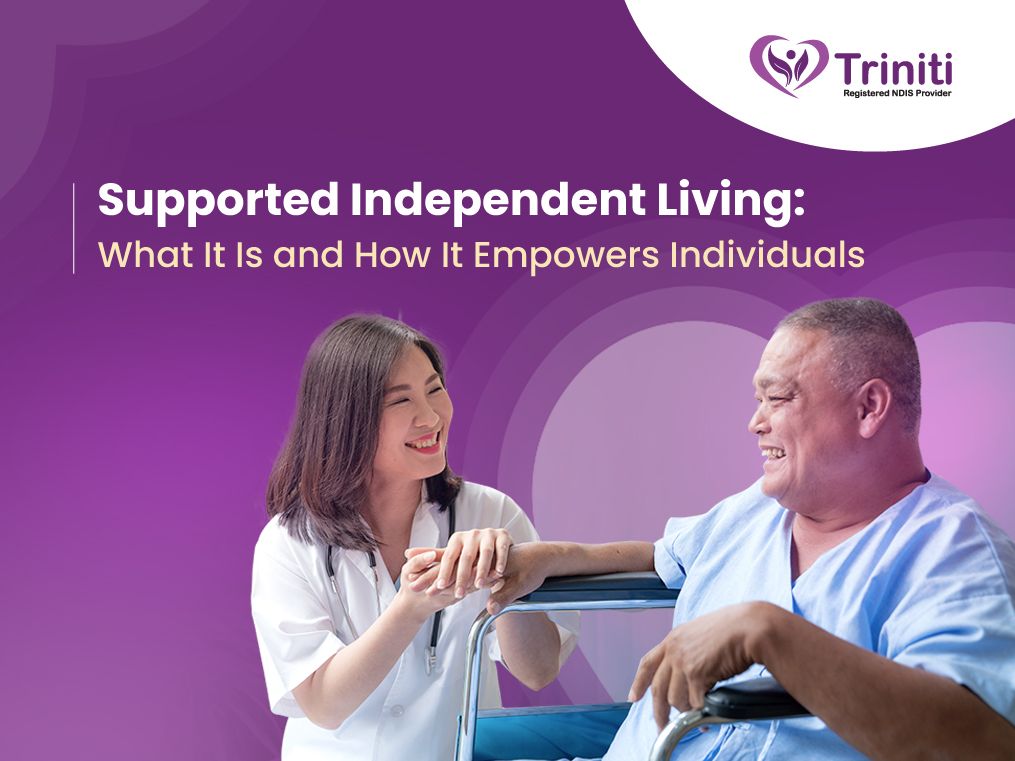+ News and Articles +
Supported Independent Living: What It Is and How It Empowers Individuals
29 May 2025 by Shine Jose
Many disabled persons—especially those who are weak or impaired in any way—may consider independent living in an apartment or a house quite elusive. But if the proper supports are made available, achieving an independent life can not only be a possibility but a life transformation. Supported Independent Living (SIL) is a service offered to empower individuals to carry quite independent lives, though they may require some nursing care and assistance.
At Triniti Care, we believe everybody deserves to live on their terms. In this article, we will discuss what Supported Independent Living is, for whom it is meant, and how this helps individuals to lead opportunities along with independent lives.
What is Supported Independent Living (SIL)?
Supported Independent Living (SIL) provides support through the National Disability Insurance Scheme (NDIS) targeted at people with higher support needs. SIL allows people to live independently, either in their own home or in a shared living environment with at least another resident.
Supported Independent Living is tailored to each individual. SIL can include support with:
- Personal care (e.g. showering, dressing, personal grooming)
- Meal preparation
- Household tasks (e.g. cleaning, laundry)
- Medication management
- Support with routines and daily living planning
- Social or community participation
Most importantly, Supported Independent Living (SIL) is not about doing everything for someone; it is about doing things with someone and supporting them to have opportunities to gain skills and confidence.
Who is SIL for?
SIL is available for people with a disability that limits their independence and requires them to have support to live independently. This includes physical, psychosocial, or intellectual disabilities that require support regularly.
It is mostly provided to people who:
- Reside in a shared accommodation with other NDIS participants
- Need ongoing supervision or support 24/7
- Have goals that include living more independently
The NDIS must assess that SIL is a "reasonable and necessary" service for you, based on your circumstances, goals, and available informal support.
Types of SIL Living Arrangements
Among the strengths that Supported Independent Living (SIL) has is that it may be quite flexible and applicable to any living arrangement. Some of the common SIL arrangements include:
Shared Living
These individuals live in a home with other participants who receive SIL support. Each has a private bedroom and receives shared support.
Individual Living
Occasionally, an individual may require support while living on their own or with a partner or family member.
At Triniti Care, we help participants find the most suitable accommodation setup that supports both their care needs and personal goals.
How SIL Empowers Individuals
Creates Independence
SIL centres on developing life skills that will allow for an increasing level of independent living. Whether learning to cook, managing money, or using a bus service, these are all things that contribute to SIL-based independent living.
Promotes Choice and Control
SIL ensures that participants make their own decisions about what to eat and how to spend their day, thus reinforcing dignity and self-determination.
Builds Social Linkages
Supported Independent Living (SIL) reduces feelings of isolation by allowing residents in a shared living arrangement to mingle with each other or support staff. It facilitates community participation and friendships, fostering a sense of community.
Increases the Quality of Life
With individualised support, an individual finds improvements in their mental health, self-confidence, and well-being. The main concern of SIL is independent living, which displaces the concept of living well.
Assists with Goal Achievement
Whether someone's goal is to find employment, start a hobby, or become more adept at handling daily living needs, SIL supports the participant's journey one step at a time towards realising these goals.
How Triniti Care Makes an Impact
At Triniti Care, we pride ourselves on providing SIL services that are person-centred, respectful, and empowering. Our teams work closely with participants, their families, and their support teams to develop plans that are tailored to an individual’s goals, likes, and unmet support needs.
We also understand that finding the best living arrangement and support team can be stressful and challenging. This is why we provide lasting advice, regular plan reviews and heartfelt care, because your independence matters to us.
If you or someone you know is thinking about Supported Independent Living, Triniti Care has the solutions you need. Together we can develop a future where independence is not just a dream, it can happen. Connect now!



